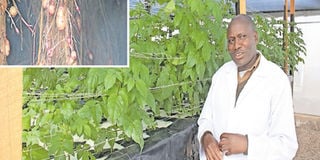Soil-less technology set to end perennial seed potato shortage

Kennedy Nyakango, the commanding officer at the National Youth Service Tumaini Farm in Nyandarua, explains how the aeroponics technology works in potato cultivation. The technology can be used to grow any crops producing tubers such as sweet potatoes and cassava but is mostly appropriate in growing potatoes. PHOTOS | JOSEPH KANYI | NATION MEDIA GROUP
What you need to know:
- The plants are grown in air or misty environment in an enclosed chamber (with no soil involved) offering higher yields per plant at a lower cost in the long run.
- Inside the boxes, roots bearing tubers are suspended in the air and are sprayed with water and a solution of nutrients.
- Each box lifted a few metres from the ground measuring 20 by 20ft hold at least 36 plantlets each producing between 60 and 70 mini-tubers.
- Aeroponic technology can be used to grow any crops producing tubers such as sweet potatoes and cassava but is mostly appreciated in growing potatoes.
Beyond the plains of the Aberdare National Park, dry maize plantations dot farms as residents prepare to clear their crops in readiness for the next planting season.
After hours on the busy Nyahururu-Nakuru highway, the Seeds of Gold team arrives at the National Youth Service Tumaini Farm in Nyandarua – one of the biggest potato production units in the country and beyond.
The farm is working on a potato seed production technology, which if fully exploited will make shortage of quality potato seeds a thing of the past. The Sh14.4 million project involves use of aeroponic technology to produce disease-free potato seeds.
The plants are grown in air or misty environment in an enclosed chamber (with no soil involved) offering higher yields per plant at a lower cost in the long run.
On the farm, there are three greenhouses under production where the plants are raised under artificial and controlled conditions in special boxes lined with insect-proof mesh.
The boxes made of wood are used in the propagation and production of Shangi and Dutch Robjin potato varieties.
The cubicles are wrapped with white cellophane and black polythene meant to ‘psyche’ the potatoes to start forming tubers.
“The polythene is supposed to ‘psyche’ potatoes to start forming tubers because once they are exposed to light, they wither while the cellophane is used to aid photosynthesis,” notes Kennedy Nyakango, the commanding officer at the station.
Inside the boxes, roots bearing tubers are suspended in the air and are sprayed with water and a solution of nutrients.
“The mist sprayers ensure the roots remain hydrated and absorb nutrients without having to stay in the soil or water,” says Nyakang’o, adding the plants are sprayed against early and late blight, aphids and white flies.
Each box lifted a few metres from the ground measuring 20 by 20ft hold at least 36 plantlets each producing between 60 and 70 mini-tubers.
OFFERING TECHNICAL SUPPORT
NYS Tumaini acquire the tissue culture materials from the Kenya Agricultural and Livestock Research Organisation or the Kenya Plant and Health Inspectorate (Kephis), which has been providing diagnostic services and guidance to the farm on seed production.
The plants start producing mini-tubers approximately 30-45 days after planting them inside the greenhouses.
“We start harvesting them at two-and-a-half months with a single plantlet producing about 60-70 mini-tubers per season,” Nyakang’o says adding that harvesting is done continuously.
NYS Tumaini Farm has already been registered as a seed merchant hence can market the certified seeds to farmers.
“Since we started in February 15, 2019, we have produced over 280,000 mini-tubers,” notes Nyakang’o, a Jomo Kenyatta University of Agriculture and Technology (Jkuat)-trained agricultural officer.
The clean seeds that are already being distributed to farmers will mitigate the spread of potato diseases such as bacterial wilt, blackleg and potato cyst nematode, according to Nyakang’o, which affects areas that have been grown for a long time.
Aeroponic technology can be used to grow any crops producing tubers such as sweet potatoes and cassava but is mostly appreciated in growing potatoes.
Currently, the farm has over 180,000 certified mini-tubers after selling others. A single mini-tuber sells at Sh15 while a 50 kilogramme sells at Sh5,000.
“The systems are 100 per cent safe and they help the environment by conserving water and reducing the amount of human labour,” he says.
According to the National Potato Council of Kenya, there is a potato seed demand of 100,000 tonnes annually but the country only produces 5,000 tonnes with Kalro offer 300 tonnes per year.
Kephis, which is offering technical support to the farm, says the rapid multiplication of potatoes will assist the country in achieving food security as well clean potatoes for farmers who re-use their produce.
Any official adds that farmers adopting the technology should go through training for chemical handling and safety and phytosanitary standards.





